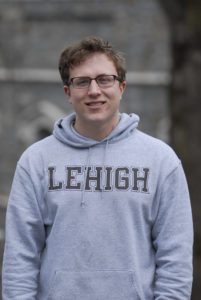
Sam Topp
I think last semester was the best possible time to become an editor for The Brown and White.
In the midst of an incredibly polarizing election, there were always discussions to have and new angles to take on issues regarding both sides of the political spectrum. Diving into different viewpoints has helped me to expand my own worldview, creating a mindset for myself I didn’t think I’d have if you asked me a year ago.
In 2016, I didn’t feel particularly strongly about any one set of ideals. I didn’t take interest in the political noise. I didn’t feel as if major changes in policy really affected my life.
But as I started to pay attention, I felt like a child starting to realize the scope of the world and its systems. At first, I only knew the ideas I agreed with. This phase was followed by figuring out which ideas I strongly disagreed with. Only recently have I wanted to understand why I disagree with others, and more importantly why they disagree with me.
Regardless of political views, there is always something to be gained by understanding the other side of an argument. It can be easy to get trapped into an “us versus them” mentality, creating a sport out of real issues that drastically affect individual lives.
If this past election and current administration have anything to tell us, it’s that regardless of what your own beliefs are, there is a large percentage of people who think in an equal and opposite way. Both the left and right see issues that need to be resolved, but proposed solutions often can’t coexist with the other ideology.
For full transparency, I identify as a socially, and generally fiscally, liberal-minded individual. I tend to lean toward Democratic policies and views, but I also don’t believe in full party loyalty, as both sides of the political spectrum have their pros and cons on different issues.
I desperately want to understand the reasons for how people who think differently than I do approach problems and possible solutions in the real world.
With that being said, this semester I will use this column as a way to dive into ideological differences and where they come from, as well as why I can’t seem to find logic in the way others think. To help, I’ve decided to discuss key newsworthy issues with an unlikely partner, Emmanuel Lai, ’17, and summarize both our discussions and the compromises we arrive at with each new topic.
Emmanuel, or Manny, identifies as moderately liberal when it comes to social issues, but is fiscally conservative. He doesn’t adhere to party loyalty, but rather to the principles of personal freedom and personal responsibility.
“I feel like it’s a very American way of thinking,” Manny said. “When one party says they want one thing, the other party says, ‘You can’t have that.’ It’s almost as if the purpose of each political party is to oppose each other.”
While we agree on this, most topics aren’t quite the same. I first met Manny at a Super Smash Bros. Melee tournament last year. As we started practicing together more and more, we began having debates during our sessions. They were light at first, and covered different political debates that were happening at the time.
But in the weeks leading up to the election, these became heated, hour-long conversations comparing and contrasting our views on issues such as abortion, immigration and most recently the prominence of “fake news” and its effect on different voter bases.
The idea for this column came out of those long discussions over a common interest that brought us together. We both see the value that can be gained through talking about our differences, and we both feel that the only way to make progress is to understand each other.
As George R.R. Martin and many others have said, “Nobody is a villain in their own story.” Being angry with someone who disagrees with you, or believes in something that you might view as immoral or evil, doesn’t help to solve the problem of working together toward a common goal.
No one acts on their beliefs with the thought that they’re the one in the wrong, and we want to try and figure out why.
—
Sam Topp, ’18, is an associate news editor for The Brown and White. He can be reached at [email protected].





Comment policy
Comments posted to The Brown and White website are reviewed by a moderator before being approved. Incendiary speech or harassing language, including comments targeted at individuals, may be deemed unacceptable and not published. Spam and other soliciting will also be declined.
The Brown and White also reserves the right to not publish entirely anonymous comments.
1 Comment
Looking forward to the journey.